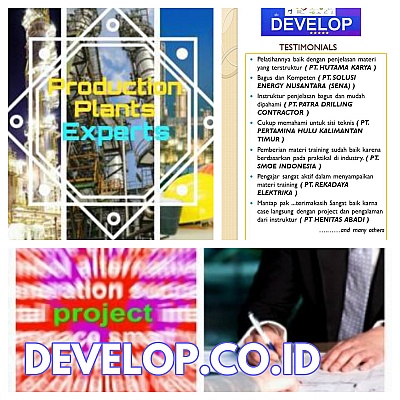Training Descriptions
Process monitors that measure and transmits information about process analyzer systems. Many of these systems were first developed for Online Analyzers.
Today they are primarily used as continuous on-line analyzers. A process monitoring system usually requires a sample conditioning system, a process analyzer, and one or more data output devices.
Properly designed systems also require overall considerations as to calibration, utilities, sample disposal, safety, and systems packaging.
Process analyzers measure chemical concentrations or physical or chemical properties that can be used as control variables instead of relying on indirect physical parameters, such as pressure, temperature, and inferred data from computer models. Process analyzer systems can provide a significant economic return when incorporated into process optimization and advanced control loops or when used for product quality control.
Analytical instruments used for online chemical analysis of process streams or plant environments are generally called Process Analyzer Systems or Quality Measuring Instruments. Reliable online analytical data is crucial for a safe and efficient operation is not limited to the Oil & Gas and Chemical Industry but also for Pharmaceutical, Power Generation and other industries.
Legislative requirements, economic as well as health and safety, emissions control and energy conservation are setting increasing stringent limits for reliable analyzer data which may result in huge losses or fines to the operating company.
For latter reasons it is obvious that sustainable optimum performance of online instrumentation, sample-handling systems and correct data handling is indispensable which requires continual professional attention from the analyzer engineers and maintenance staff.
To achieve optimal performance a thorough understanding of operating principles, possible interferences and practical skills are key requirements.
In this course complete analyzer systems are discussed while special attention is given to applied sampling systems next to the main types and principles of currently applied Process Analyzers ranging from Physical Properties, online
Chromatography, Water type analysis to the promising future of Spectroscopic type of on-line analysis while advantages and disadvantages are clarified with the aim to enhance the understanding the operational ranges and limitations of each type of analysis system.
Training Hand Out will provided 600 Pages
Training Syllabus
• INTRODUCTION ANALYZER SYSTEM
o Introduction
o Purpose
o References
o Glossary, Definitions & Formulae
o Process Measurement
o Process Analyzers
o Analytical Measurements
o Process Analyzers System
• ANALYZER STRATEGY
o Implementation Strategy Procedures
o Installation, Inspection, Testing, and Startup Requirements
o Safety Requirements
• ANALYZER PROJECT MANAGEMENT AND ANALYZER ENGINEERING
o Analyzer Project Management and Analyzer Engineering
• PROCESS ANALYZER CONSIDERATIONS
o Process Analyzer Considerations
o Installation and Safety
o Inspection and Testing
o Commissioning
o Safety Requirements
o Maintenance Requirement
o System Data Management Requirements
o Analyzer System Calibration and Validation
o Design Factor
o Prepackaged Systems
o The Principles Sampling System Design
o Flow and LAG Time Calculations
• SPECTORSCOPIC CHEMICAL COMPOSITION ANALYZERS
o Infrared Spectroscopy
o Ultraviolet (UV) Spectroscopy
o Mass Spectroscopy
o X– Ray Absorption
o Ion Mobility Spectroscopy
o Ion Mobility Spectroscopy
• NON- SPECTORSCOPIC CHEMICAL COMPOSITION ANALYZERS
o Gas Chromatograph
o Moisture Analyzer
o Oxygen Analyzer
o Sulfur Analyzers
• PHYSICAL PROPERTY ANALYZERS
o Pour Point Analyzers
o Cloud Point and Freeze Point
o Distillation
o Flash Point Analyzers
o Vapor Pressure Analyzers
o Octane Analyzers
o Process Stream Viscometers
o Densitometer
o Color Analyzers
• CHEMICAL PROPERTY ANALYZERS
o pH Measurement
o Oxidation- Reduction Potential (ORP) Measurement
o Electrolytic Conductivity Measurement
o Water Quality General Information
• RELIABILITY CENTERED MAINTENANCE ANALYZER
o RCM (Reliability Centered Maintenance) for Analyzers Equipment
o FAT Procedure for Analyzer House
o FAT Procedure for Gas Chromatograph
Training Objectives
Upon the successful completion of this course, each participant will be have knowledge on:
• requirement for analyzer system data management.
• Information on analyzer calibration and validation.
• Extensive information on the proper design of analyzer sample systems.
• The benefits of pre-packaging analyzer systems over field construction methods.
• Information on the installation and maintenance of analyzer systems.
• Information on safety in the design of analyzer systems
• purpose, operation of sample handling and application of a Process Analyzer system, Quality Monitoring systems and Spectroscopic Analyzer systems,
• principles of the applied types of Physical Property analyzers and Gas Chromatography,
• Identifying and explain the different types of QMI applications like Process Quality control and Emission Monitoring (CEMS),
• Understanding of the Analyzer Strategy for daily basis Understanding of the Installation, Inspection, Testing and Start up Requirements for analyzer Houses and analyzer Equipment
• Understanding of the basic tools for Analytical Performance & Quality Assurance.
• Understanding of the Analyzer Project Management and Analyzer Engineering
• Understanding of the Reliability Centered Maintenance Analyzer
Participants
• Engineering Project Team
• Related Engineering Designer Team
• Process Engineering
• Designer
• Project Managers and Project Engineers Design
• Maintenance and Operation Teams
• Reliability Teams
• other Engineering Disciplines Related
 Process Analyzers for Maintenance and Reliability Engineering
Process Analyzers for Maintenance and Reliability Engineering QUICK REGISTER :




 How can we help you today?
How can we help you today?